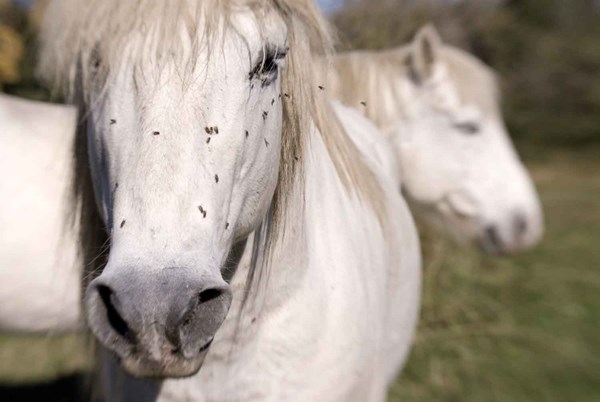 Credit: Thinkstock
Credit: ThinkstockOne strategy for managing fly control hinges on killing developing flies within the manure. A few companies have developed a feed-through larvicide for this purpose. It works like this: The horse is fed a daily dose of “medicated” alfalfa pellets and once the drug passes through the horse’s intestinal tract into the feces, it inhibits larval development before the larva mature into flies.
The effectiveness of this insect control method depends on the horse receiving the correct dose and that it is administered every day, and that all horses on the farm receive it otherwise flies will flourish in untreated manure. It is also important to keep in mind that manure is not the only place where flies breed, especially stable flies. They also do well in decomposing organic debris anywhere on the farm, including soiled stall bedding or damp, fermenting hay beneath pallets, as just a few examples. Further, flies that migrate in from other areas are unaffected by this medication at least until they lay eggs in treated manure.
Several choices of feed-through larvicides are available:
Cyromazine: Solitude IGR (Zoetis, used to be called Serene)
Diflubenzuron: Equitrol II Feed-Thru Fly Control; Simplify with Larva-Stop Feed-Thru Fly Control (Farnam)
Tetrachlorvinphos: Equitrol Feed-Thru Fly Control
Cyromazine and diflubenzuron contain a growth regulator that hinders maturation of immature fly larvae so they die. Tetrachlorvinphos kills larvae that hatch in the manure; however, as an organophosphate–a drug that is quite toxic to the equine liver–it is no longer a recommended drug to use. Discuss with your veterinarian if any of the feed-through larvicides are appropriate for use with your horses.
There are reports that resistance is developing to drugs like cyromazine, thereby rendering this treatment method less effective. Another point of consideration is how the feed-through larvicide might affect other invertebrates that breed in manure. Some are beneficial, such as dung beetles. In addition, the larvicide also has the potential to adversely impact parasitic wasps. The watershed should be protected as larvicides can be harmful to aquatic life if not used properly.


